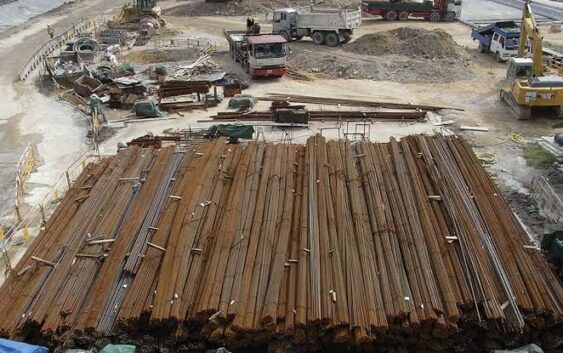- HOW TEMANE-MAPUTO ELECTRICITY TRANSMISSION LINE PROJECT IS GOING THROUGH TEST IN MOZAMBIQUE
- NAMIBIA INAUGURATED FIRST PLASTIC RECYCLING PLANTS
- PROGRESS MADE ON PIIM PROJECTS AS OVER 85% COMPLETED IN ANGOLA
- WORLD BANK KICK-OFF INSPECTION OF USMID PROGRAM IN UGANDA
- ALGERIA MINISTER RECIEVED HARBOR ENERGY CEO OVER ENERGY PARTNERSHIP
NIGERIA CONSTRUCTION INDUSTRY HITS HARD DUE TO RAISE IN COST OF MATERIALS

The rising cost of building materials in Nigeria is increasingly hitting the construction industry hard, with fears that a large number of projects could be put on hold as developers are now on edge about what to do.
Already, households are contending with soaring food prices and energy costs, and added to it now is the soaring building materials prices which have doubled in the last 12 months on the heels of surging inflation.
The property industry relies on mostly imported building and construction materials, and items such as tiles, cement, zinc, and iron rods among others
Nigeria’s headline inflation, which rose to 28.92 per cent in December 2023, has jacked up the price of building materials, notably cement, reinforcement bars (iron rods), roofing sheets, tiles, paints, and even sand by about 50 per cent.
Experts have attributed the rising inflation to fuel subsidy removal, the floating of the naira which has seen extreme pressure on the local currency, the pandemic impact of the Russia-Ukraine war, as well as the cost of other commodities.
Prices of building materials going over the roof
Checks by Daily Trust show that three major cement producers in Nigeria – Dangote, Bua and Lafarge – have their prices range from N7,400 to N7,600 depending on location.
The cement production value chain in Nigeria is dominated by three major producers. BUA is controlling about 17.6 per cent of the market, Dangote 60.6 per cent and Lafarge 21.8 per cent, which allegedly fence off potential players and competitors.
Findings by Daily Trust show that in Abuja, the price of Dangote cement and Bua cement at major retail shops is sold between N7,500 and N7,800 in Abuja while in Kano, it is sold at between N7,800 and N8,000.
A breakdown of cement prices shows that the commodity has increased by over 70 per cent between 2022 and July 2023. The cost of a 50kg bag of cement increased from N4,200 to N4,900 in Lagos, Ogun, Ondo and Abuja, while in some locations, it went up to N5,000 as at the end of December 2023. Meantime, the highest cost of cement now is about N8,000.
Also, block makers charge between N550 and N650 for the 6-inch vibrated blocks and between N700 and N750 for the 9-inch vibrated blocks.
Similarly, a recent market survey shows that the prices of paint have doubled in the last three years. For instance, in 2020, a bucket of 4 litres of emulsion paint went for as low as N1,000, however, the same bucket is now sold at N2,000. This also applies to all other sizes as the 20 litres which was sold at between N5,000 and N6,000 is now sold at between N11,000 and N12,000 depending on the location and part of the country.
Charles Ikpe, a tiler and trader on doors, lamented low patronage as people were finding it difficult to continue with their housing projects as a result of the high cost of materials, adding that the exchange rate was also a contributing factor.
“The decline in the number of people building houses has affected the business because of the low purchase rate of these materials,” he said.
“Currently, we sell floor tiles (40×40) for N5,000 per metre, as against N2,500, it was sold last year. The price increase is also dependent on the measurements and type.
“As long as the dollar exchange rate continues to increase, prices of building materials will increase. Also, we blame the increase in fuel, transportation and taxes. The rate at which people build houses has reduced, and the demand for materials has also reduced.
Also speaking, a cement dealer in Garki, Abuja, Chuka Ike, said business owners have never had it this bad as sales have remained very low due to the rising cost of cement.
“On a normal day, I sell between 200 and 250 bags of cement but now I barely sell up to 50 bags. Customers are now complaining they can’t buy cement for that amount and are waiting to see if the price will come down and only God knows when it will come down,” he said.
“Every day, prices of cement are going up, many of my customers have stopped coming and when I asked they say they can’t afford the amount, it’s so sad,” he further lamented
Expert speak
Meanwhile, an estate surveyor, Salim Magaji, told Daily Trust that the current situation if not arrested will have severe impact on the construction sector.
He said “Projects have slowed because the cost of construction materials has gone out of control. Nowadays, both the government and private sector contractors are in a fix because usually when they are engaged, they are substantially mobilized so that they can buy all they want to buy and keep.”
“The aim of substantial mobilisation of the contractors was to avoid cost variation, which has put many projects at risk at the moment. But today, contractors will buy materials at a price but when they go back tomorrow it will be another story and that has taken a lot of projects back.
According to him, in the South-West states, Lagos, which is the commercial nerve centre of Nigeria, is the most prominent in terms of abandoned projects due to high cost of materials.
“On Lagos Island, many high-rise commercial and residential building projects are either on hold or progressing at a very slow pace and something must be done urgently,” he added.

